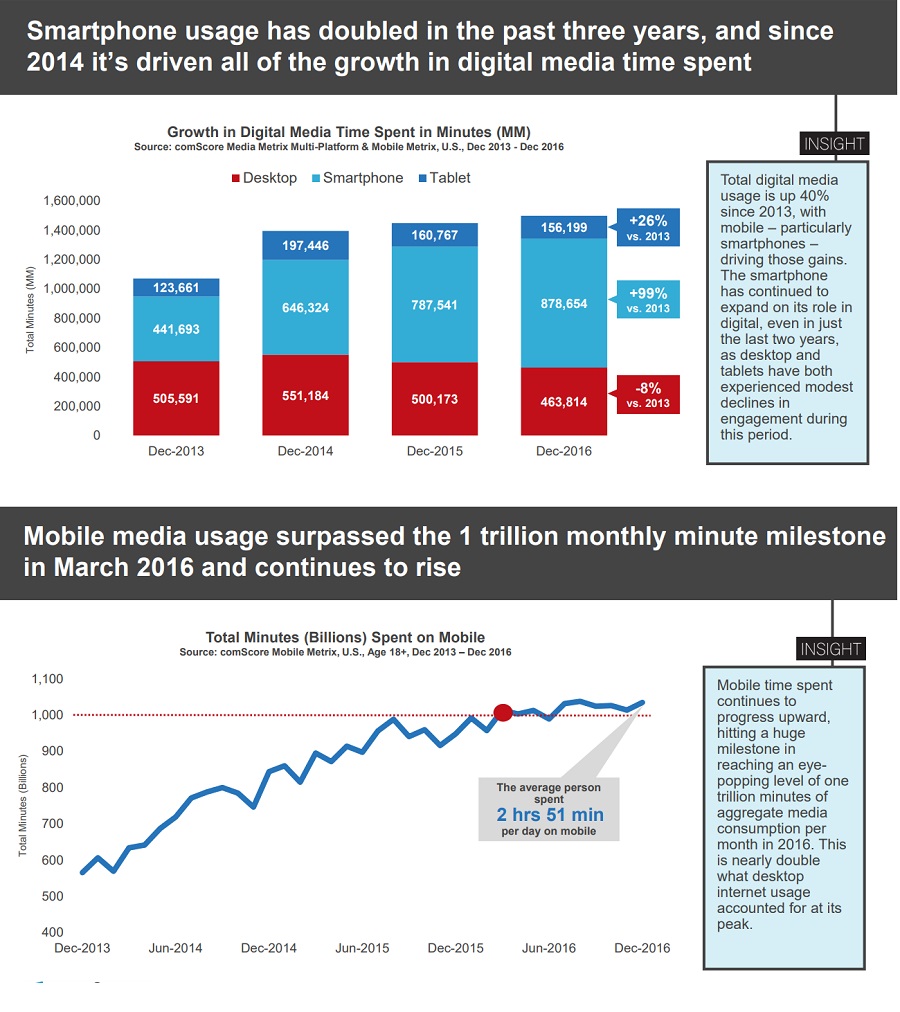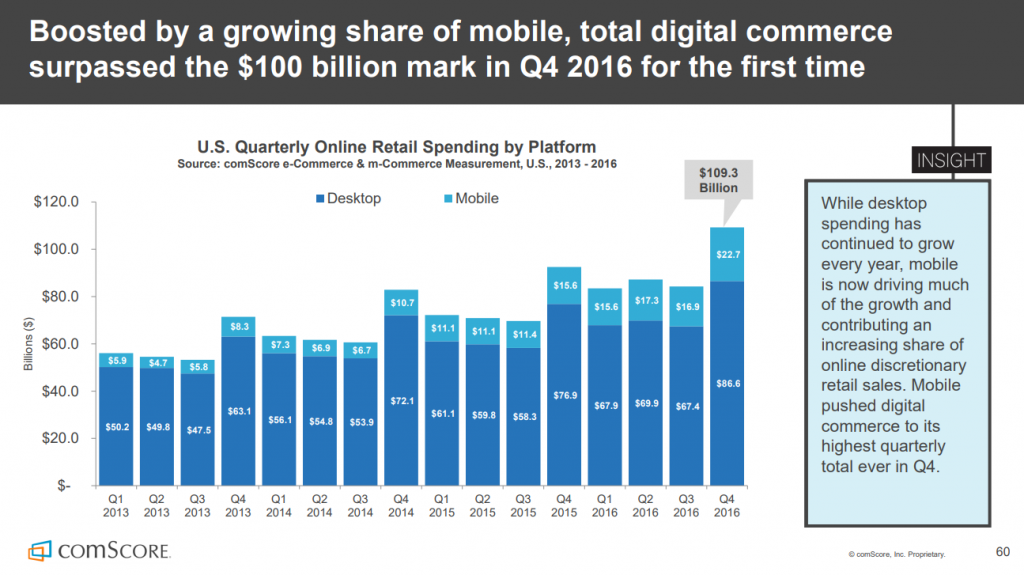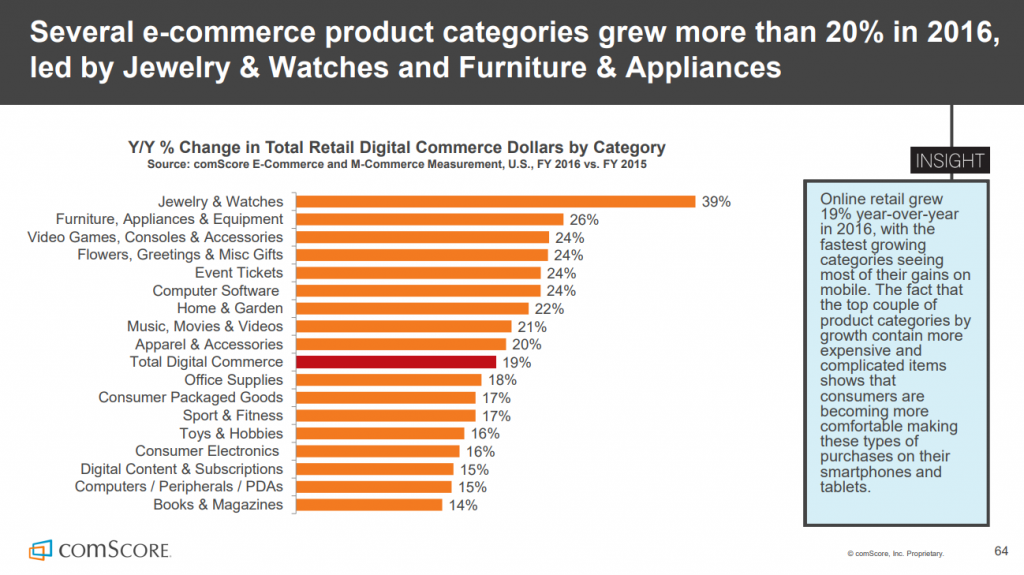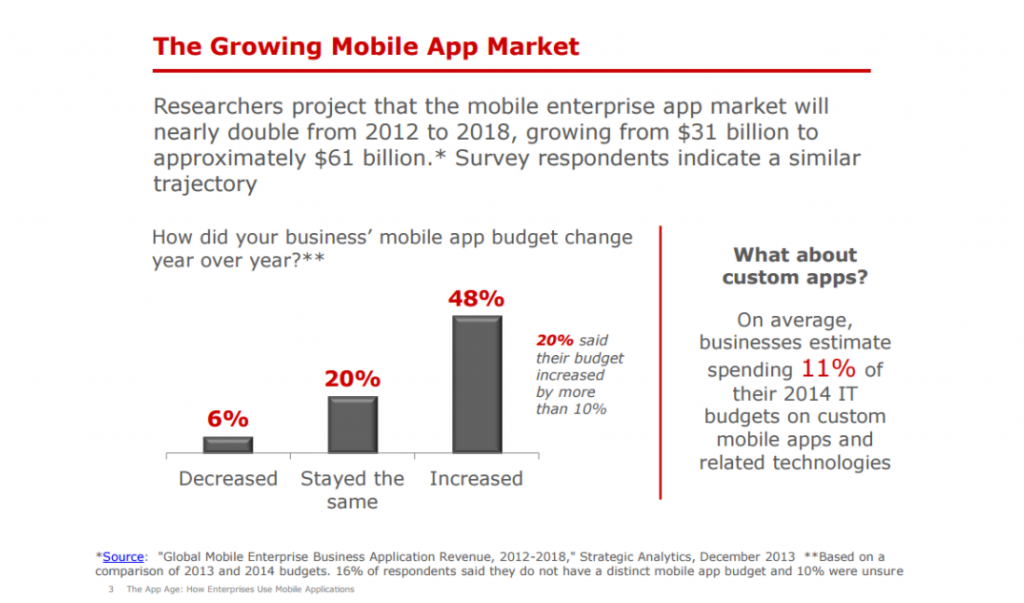Introduction
Development of mobile applications has made smartphones universal problem solvers that make almost any task accomplishable with a single tap. The majority of these life-saving software came from innovative startups or huge corporations, but is there a place for small business apps?
When touch-screen smartphones hit the shelves, small and midsize business couldn’t afford to get their own apps. It was tough to find and hire a reliable specialist with relevant expertise. Today the situation has changed due to rising popularity of app development and means for software building.
It allowed SMB to take a cautious step into the mobile market. And while a segment of business mobile application development is only nucleating, we offer you to consider how getting an app can benefit your business.
Business adopts mobile apps
According to the latest Crunch survey, 20% of questioned SMBs have launched an app back in 2015-2016, and about 27% plan to get one in 2017. Despite that there is a clear connection between gaining the upper hand over competitors and a mobile app for an enterprise, businesses do not rush into the tech world.
Now we have two types of apps that businesses work with, although, sometimes they are combined in one big software product. These are customer-facing and meant-for-internal-use-only applications.
Let’s cover the first type and how it benefits SMBs and any kind of business in general.
Customer-facing apps
So, a customer-facing app is basically a tool that works directly with your prospect. It makes the client feel like a valuable part of your business and can be used as a tool for specific user analysis.
Why do companies invest in the development of customer-facing mobile applications?
1. Raise brand’s visibility and recognition.
By the end of 2016, an average American spends nearly 3 hours on mobile each day.That is nearly 90 hours per month, where 71% of total mobile minutes is spent in apps.
Although only several apps are used on a daily basis, the user still has to swipe and scroll on the way to the desired one. Meaning that your app’s icon will get imprinted on their mind, whether they want it or no.

2. Provide 24/7 access to the product
Users impatience grows together with internet speed. Now being available during working hours is not enough. Win the favor of your target audience with making your products or services available at whatever time.
3. Create a controlled media channel for continuous outreach
Users impatience grows together with internet speed. Now being available during working hours is not enough. Win the favor of your target audience with making your products or services available at whatever time.
4. Boost customer loyalty
Ditch the point-collection card and switch to the digital sub. This way all stored bonuses and special offers will be available through the application. Having a loyalty program connected to an app guarantee that it is going to get downloaded to devices and make customers return.
5. Push up sales
By the 4th quarter 2016, the online retail spending on the mobile platform has doubled since 2015 and reached $22.7 billion. While desktop spendings show stable growth each year, mobile is now giving the ⅕ part of the total app revenue ($109.3 billion) and continues to increase the share of online discretionary retail sales.

Moreover, the categories of spendings become more and more expensive that means consumers become more and more comfortable with making this kind of purchases online.

If you were cautious about developing an app because your product costs more that one Benjamin Franklin, worry no longer. Apps have gained trust and means to ease the purchasing process both for end-consumer and for the supplier.
In short, customer-facing mobile apps create a deep connection with customers and build brand’s dedicated audience. Now we have figured why brands utilize apps meant for customer-use only. However, why businesses use apps for internal processes?
Well, yeah, that is quite obvious, but many fail to answer when asked to put it in words and give legit reasons. Here’s what we think about why SMB deploy their enterprise mobile apps and how it benefits them.
Mobile apps for SMB internal use
In order to be truly competitive and go hand-in-hand with digital transformation, it is essential to develop and apply mobile app strategies inside the organization. However, despite the widespread opinion that mobile apps give a competitive advantage to businesses, many companies have yet to adapt their strategies to aim at digitalization.
Right now businesses are in the midst of adopting mobile apps as a solution for their internal needs.

What can these applications do for business?
1. Increase personnel efficiency
Taking into the account that today people spend nearly 3 hours in mobile apps, just how much of this time befalls on working hours? People use apps as they walk, have lunch and in spare time. By investing into a development of mobile application businesses provide their personnel with a useful tool that allows working off-site and whenever you feel like it. It stimulates their desire to work and complete tasks, as mobile app unties them from a certain working place.
According to the CDW Newsroom survey results, so far having a business application has saved 7.5 hours of work-time per employee in a week. Sounds crazy, right? Nearly one full working day.
2. Improve communication
More than a third of questioned companies confirm that the internal communication and cooperation has gotten better since the acquisition of the custom application. Having an app simplifies the process to the basis when a team does not have to wait for a single member to come to work due to sick leave or a vacation. All issues are solved in real time.
3. Recuse expenses
More and more companies switch to remote work mode. Have you heard how WordPress parent – Automattic – has closed down their office in San Francisco because only 1% of the hired personnel was going there to work? Out of 15K square feet of working space, only about 100 were used accordingly.
A single solution that is supported on multiple devices can drastically cut down the expenses by excluding such expenditure items as lease, travel expenses and the overall office maintenance.
That is only the basics, without going deeper into the subject. However, all that can be solved with a ready-made off-the-shelf application. Is there a reason for investing into a custom business app instead of using an off-the-shelf solution and do companies really benefit from it?
Why do companies go for a custom built app?
These mobile apps are mostly used for:
Small Business:
- Ease of communication
- Supporting sales and analytics
- Service support
Medium business:
- Business processes automation
- Communication
- Collaboration
Web and mobile applications have become an equally popular business solution for both huge corporations and small businesses. If there is any time to switch from desktop to mobile, it is now.
Analyze the most used desktop applications and determine the main features that mobile workforce works with, once that is done you will be able to define whether you need a custom solution, or a ready-made app will do.
Remember, custom apps allow you to set things up the way you want, not the way application wants you to.
Summary
Today’s reality is that you cannot survive on the market without a mobile website or application, as more and more people switch from desktop to mobile devices. SMB should not be afraid to invest into application development, as it will surely have a positive impact on the business and general working pace. Raise competitiveness of your business by utilizing technologies.
Contact IDAP tech squad to find out more about possible technological solutions that can automate your business process.



